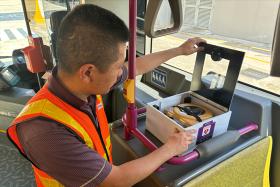Firms must ensure riders have third-party liability insurance
Businesses using active mobility devices on paths, including food delivery services, will soon be required to ensure that their riders are covered by third-party liability insurance.
Senior Minister of State for Transport Janil Puthucheary said such organisations have a responsibility towards riders and members of the public in the course of business.
This law will first be applied to device-sharing operators who are licensed under the Shared Mobility Enterprises Bill, and businesses who employ or contract with riders who ride active mobility devices on public paths for work, such as food delivery companies, Dr Puthucheary added.
He said: "We are working with the Active Mobility Advisory Panel and the insurance industry to study how best to extend such insurance requirements to individual active mobility device riders."
The requirement is among a set of new measures Parliament agreed upon yesterday, after members passed two Bills to expand regulations for users, retailers and shared mobility enterprises that make use of active mobility devices.
For retailers, tougher laws and penalties will also be rolled out, to ensure compliance of the devices sold.
Dr Puthucheary said that last year, there were 28 instances where retailers were caught for various offences, including displaying and advertising non-compliant active mobility devices.
To prevent such behaviour, retailers will soon have to send e-scooters for inspection to certify that they comply with the prescribed device criteria before they are allowed to register, display, advertise or sell the e-scooters.
The ministry will also strengthen the Land Transport Authority's ability to take enforcement action against illegal modifications, to cover all modification activities on active mobility devices that are allowed for use on public paths, whether or not undertaken in the course of business.
They will also significantly increase penalties for retailer offences to send out a strong message of deterrence.
Dr Puthucheary said: "The penalty for selling a non-compliant device for use on public paths will be increased by more than four times."
The penalty will be changed from a maximum of $5,000 and three months' imprisonment, or both, to $20,000 and 24 months' imprisonment, or both, for a first-time offender who is an individual.
Retailers and corporate entities that cannot be subject to imprisonment will face up to $40,000 for the first offence.
Get The New Paper on your phone with the free TNP app. Download from the Apple App Store or Google Play Store now



